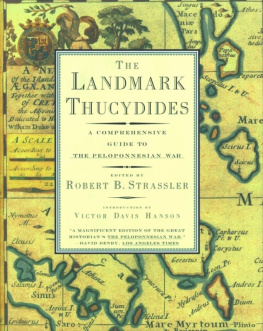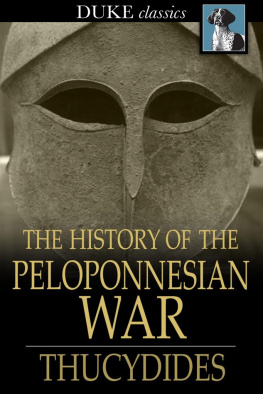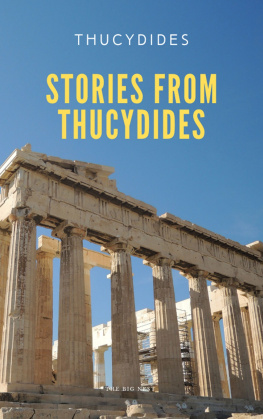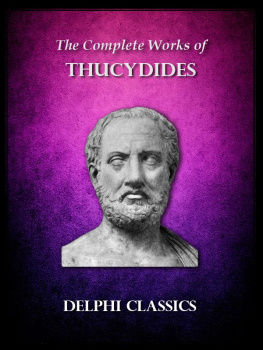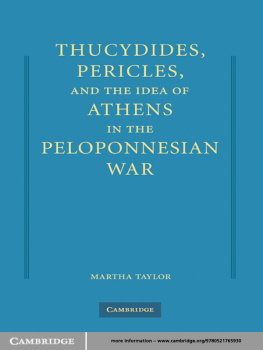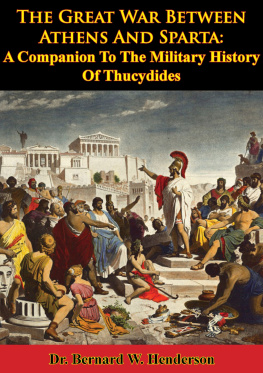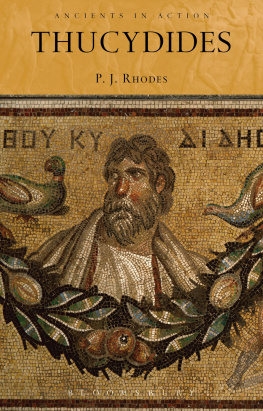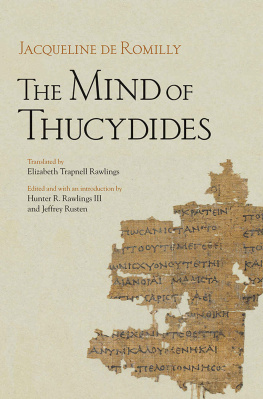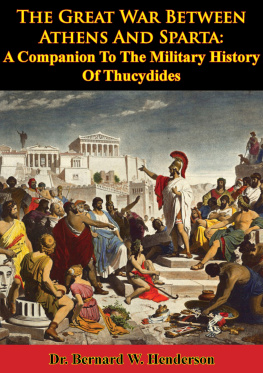OXFORD WORLDS CLASSICS
THE PELOPONNESIAN WAR
THUCYDIDES (c.460400 BC) was a member of the aristocratic Athenian family which provided the opponents of the democratic leader Pericles, but himself became an admirer of Pericles, though not of democracy except when guided by Pericles. His subject is the Peloponnesian War. This was fought between Athens and Sparta, the two leading powers of fifth-century Greece, and eventually won by Sparta. Thucydides started work at the outset of the war in 431, expecting it to be more momentous than any previous conflict. He served as a general in the war, but was exiled after failing to keep the city of Amphipolis out of Spartan hands in 424/3. He returned to Athens at the end of the war, but although a few sentences refer to later events his surviving narrative breaks off in the autumn of 411. He is more narrowly focused on the war than his predecessor Herodotus (c.485425) had been on the Persian Wars at the beginning of the fifth century, and his work has great intellectual power: he was energetic and intelligent in establishing the facts and penetrating in his judgement of general issues; he explains events wholly in human terms; the work is skilfully composed, with a blend of plain and vivid narrative passages, and with speeches which often explore the nature of power. Thucydides history is indeed the permanent legacy which he intended it to be.
MARTIN HAMMOND was born in 1944 and educated at Winchester College and Balliol College, Oxford. He has taught at St Pauls School, Harrow School, and Eton College, where he was Head of Classics from 1974 to 1980, and Master in College from 1980 to 1984. He was Headmaster of the City of London School from 1984 to 1990, and of Tonbridge School from 1990 to his retirement in 2005. He has also translated the Iliad (Penguin, 1987), the Odyssey (Duckworth, 2000), and the Meditations of Marcus Aurelius (Penguin, 2006). He is married, with two children.
P. J. RHODES is Honorary Professor and Emeritus Professor of Ancient History at the University of Durham. He has written widely on Thucydides and ancient Greece; one of his most recent books is A History of the Classical Greek World 478323 BC (2005).
OXFORD WORLDS CLASSICS
For over 100 years Oxford Worlds Classics have brought readers closer to the worlds great literature. Now with over 700 titlesfrom the 4,000-year-old myths of Mesopotamia to the twentieth centurys greatest novelsthe series makes available lesser-known as well as celebrated writing.
The pocket-sized hardbacks of the early years contained introductions by Virginia Woolf, T. S. Eliot, Graham Greene, and other literary figures which enriched the experience of reading. Today the series is recognized for its fine scholarship and reliability in texts that span world literature, drama and poetry, religion, philosophy, and politics. Each edition includes perceptive commentary and essential background information to meet the changing needs of readers.
Refer to the to navigate through the material in this Oxford Worlds Classics ebook. Use the asterisks (*) throughout the text to access the hyperlinked Explanatory Notes.

Great Clarendon Street, Oxford OX2 6DP
Oxford University Press is a department of the University of Oxford.
It furthers the Universitys objective of excellence in research, scholarship,
and education by publishing worldwide in
Oxford New York
Auckland Cape Town Dar es Salaam Hong Kong Karachi
Kuala Lumpur Madrid Melbourne Mexico City Nairobi
New Delhi Shanghai Taipei Toronto
With offices in
Argentina Austria Brazil Chile Czech Republic France Greece
Guatemala Hungary Italy Japan Poland Portugal Singapore
South Korea Switzerland Thailand Turkey Ukraine Vietnam
Oxford is a registered trade mark of Oxford University Press
in the UK and in certain other countries
Published in the United States
by Oxford University Press Inc., New York
Translation Martin Hammond 2009
Editorial material P. J. Rhodes 2009
The moral rights of the author have been asserted
Database right Oxford University Press (maker)
First published as an Oxford Worlds Classics paperback 2009
All rights reserved. No part of this publication may be reproduced, stored in a retrieval system, or transmitted, in any form or by any means, without the prior permission in writing of Oxford University Press, or as expressly permitted by law, or under terms agreed with the appropriate reprographics rights organization. Enquiries concerning reproduction outside the scope of the above should be sent to the Rights Department, Oxford University Press, at the address above
You must not circulate this book in any other binding or cover
and you must impose the same condition on any acquirer
British Library Cataloguing in Publication Data
Data available
Library of Congress Cataloging-in-Publication Data
Thucydides.
[History of the Peloponnesian War. English]
The Peloponnesian War / Thucydides; translated by Martin Hammond, with an
introduction and notes by P.J. Rhodes.
p. cm.(Oxford world classics)
Includes bibliographical references and index.
ISBN 9780192821911
1. GreeceHistoryPeloponnesian War, 431404 B.C. I. Hammond, Martin, 1944
II. Rhodes, P. J. (Peter John) III. Title.
DF229.T5H36 2009
938.05dc22
2008049469
Typeset by Cepha Imaging Private Ltd., Bangalore, India
Printed in Great Britain by
Clays Ltd., St Ives plc
ISBN 9780192821911
1 3 5 7 9 10 8 6 4 2
PREFACE
THIS book is a collaboration. It has been a pleasure and a reassurance to work closely with Peter Rhodes on every aspect of the book at every stage. I am responsible for the translation, the index, and (for the most part) the decisions on which reading to adopt in the many places where the Greek text is in doubt: Peter for all the rest of the book. The process has been interactive. In a series of virtually weekly emails we have seen and commented on each others drafts section by section, and I am gratefully conscious that hardly a page of my translation has not benefited from improvements to my first draft suggested by Peter.
Thucydides admired energy, inventiveness, and intellectual power, and all these qualities are manifest in his own writing. He wrote very difficult Greek, in (as far as we can tell) a highly idiosyncratic style. Narrative sections are brilliantly fast and vivid (e.g. the description of the plague, 2.4754; the escape from Plataea, 3.204; the battle on Epipolae, 7.434), but when Thucydides brings his intellect to bear, either authorially or in densely textured speeches given to politicians or military men, on the wider and more permanent issues which interested him (e.g. the nature of power, the self-perpetuating logic of empire, the moral collapse in civil war, the clash of rival political systems, cultures, and ideologies), his thought is complex and compressed, set out in innovative language itself so compressed that regular syntax on occasion buckles under the pressure, and a two- or three-word phrase can need careful and sometimes contentious unpacking. The translator needs all the help he or she can get. In addition to the constant vigilance of Peter Rhodes, I have been very fortunate to benefit from the generosity of Chris Pelling and Simon Hornblower. Chris Pelling, Regius Professor of Greek at Oxford, very kindly read the entire translation in draft, and his comments and suggestions have been gratefully incorporated into the final version, much improving what I had first written. Simon Hornblower, Professor of Classics and Grote Professor of Ancient History at University College London, generously allowed both me and Peter Rhodes photocopies of the typescript of the third and final volume (5.25end) of his magisterial
Next page

